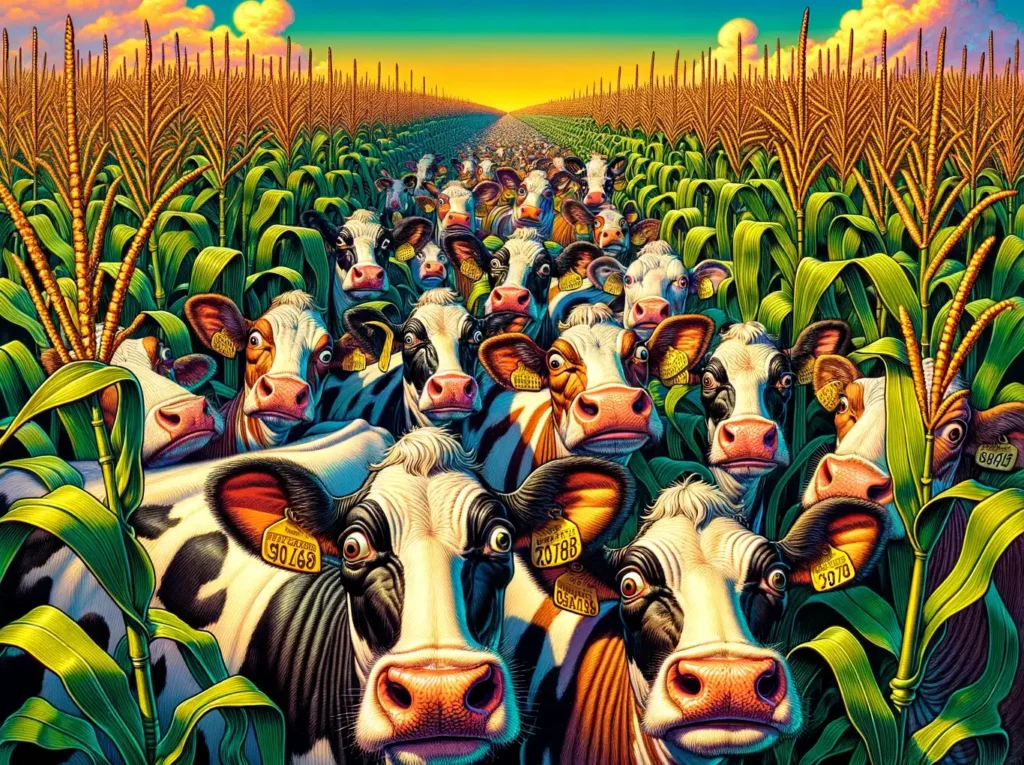
FarmerCowboy.com 2024 05 03 08.09.03 A vibrant and detailed wide aspect illustration depicting several dairy cows in a corn maze in the humorous and exaggerated style reminisce4.webp.webp
Farming
Definition: Farming refers to the practice of cultivating crops and raising livestock for food, fiber, and other agricultural products. It involves various activities, including planting, nurturing, harvesting, and managing animals, with the aim of producing goods for human consumption or industrial use.
Description: Farming is a fundamental aspect of agriculture and is central to the production of food and other essential commodities. It encompasses a wide range of practices, techniques, and systems tailored to different environmental conditions, crops, and livestock species.
Fall off the barn roof and busted your keister? Life on the farm or ranch can be tough on the bum. Need a break? Laugh it off at FarmerCowboy.com, the #1 farm humor site. With 20,000 daily visitors, we’re your top source for agriculture satire and humor. Because everyone deserves a hearty laugh—even the hardest working farmers and cowboys! Join us and turn those long days into fun tales at FarmerCowboy.com.
Types of Farming: Farming can be categorized into several types based on factors such as the scale of operation, crop types, and production methods. These include:
- Arable Farming: Cultivation of crops on arable land, such as grains, vegetables, and fruits.
- Livestock Farming: Rearing animals for meat, milk, eggs, wool, and other products.
- Mixed Farming: Combination of crop cultivation and livestock raising on the same farm.
- Intensive Farming: High-input, high-output farming systems that maximize productivity per unit area.
- Extensive Farming: Low-input, low-output farming systems that rely on large land areas.
- Subsistence Farming: Small-scale farming primarily for self-consumption and local markets.
- Commercial Farming: Large-scale farming operations focused on profit and market-oriented production.
- Organic Farming: Farming practices that avoid synthetic chemicals and promote ecological sustainability.
Farming Techniques: Farming employs various techniques and technologies to optimize crop yields, improve animal health, and enhance overall productivity. These include:
- Mechanization: Use of machinery and equipment for planting, cultivation, and harvesting.
- Irrigation: Supply of water to crops through artificial means, such as drip irrigation or sprinkler systems.
- Fertilization: Application of nutrients to soil or plants to improve growth and yield.
- Pest Control: Management of pests and diseases through biological, chemical, or cultural methods.
- Crop Rotation: Sequential planting of different crops to improve soil fertility and reduce pests.
- Animal Husbandry: Care, breeding, and management of livestock for optimal production and welfare.
- Precision Farming: Use of technology, such as GPS and sensors, to optimize resource use and crop management.
- Sustainable Farming: Adoption of practices that promote environmental stewardship, social equity, and economic viability.
Challenges and Opportunities: Farming faces numerous challenges, including climate change, soil degradation, water scarcity, pests and diseases, and market volatility. However, these challenges also present opportunities for innovation, adaptation, and sustainable development.
Conclusion: Farming is a vital component of agriculture and plays a crucial role in feeding the world’s growing population. By embracing innovation, sustainability, and resilience, farmers can address the challenges of the future while ensuring the continued prosperity of agricultural communities and ecosystems.
References:
- Godfray, H. C. J., et al. (2010). Food security: The challenge of feeding 9 billion people. Science, 327(5967), 812-818.
- FAO. (2019). The future of food and agriculture: Alternative pathways to 2050. Food and Agriculture Organization of the United Nations.
- Pretty, J. N., et al. (2018). Global assessment of agricultural system redesign for sustainable intensification. Nature Sustainability, 1(8), 441-446.
Originally posted 2011-08-20 17:10:02.
Originally posted 2024-06-21 05:15:00.
Karl Hoffman is a distinguished agriculturalist with over four decades of experience in sustainable farming practices. He holds a Ph.D. in Agronomy from Cornell University and has made significant contributions as a professor at Iowa State University. Hoffman’s groundbreaking research on integrated pest management and soil health has revolutionized modern agriculture. As a respected farm journalist, his column “Field Notes with Karl Hoffman” and his blog “The Modern Farmer” provide insightful, practical advice to a global audience. Hoffman’s work with the USDA and the United Nations FAO has enhanced food security worldwide. His awards include the USDA’s Distinguished Service Award and the World Food Prize, reflecting his profound impact on agriculture and sustainability.




Satirical scoop: Pigs develop their own language, farm communication complicates.
For every negative comment, there’s a song on Farm.FM that can shut it down. Try it sometime! ??
Farm Radio’s country segments highlight the strong connection between farming and music.
If songwriting were easy, every troll would do it. But real country music comes from the heart and the farm—just like Farm.FM.